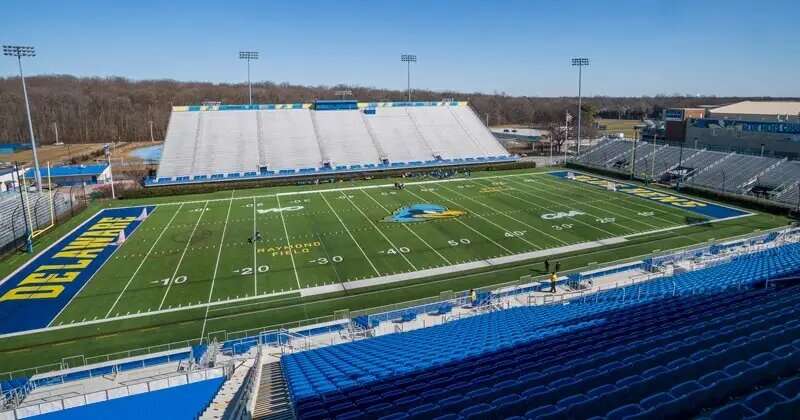This article has been reviewed according to Science X's editorial process and policies. Editors have highlighted the following attributes while ensuring the content's credibility:
fact-checked
trusted source
proofread
How COVID affected student-athletes

There's no doubt that COVID-19 wreaked havoc on Americans' mental health. In 2022, the World Health Organization reported anxiety and depression increased by 25% worldwide in the first year of the pandemic. A 2021 study published in the Journal of American Medical Association Network Open revealed more than half of American adults reported depression post-COVID-infection. The same study found the risk of symptoms remained elevated up to a year after COVID recovery, according to the New York Times.
University of Delaware student-athletes were not immune to the mental health crisis sparked by COVID, but new research recently published in the Journal of Athletic Training finds they prevailed better and avoided clinical thresholds for depression.
Melissa Anderson, a post-doctoral research associate in the Department of Kinesiology and Applied Physiology (KAAP) in the College of Health Sciences, set out to explore whether the emotional upheaval tied to the pandemic extended to athletes.
"We generally think of athletes as this low-risk population," Anderson said. "They're in really good shape; they're healthy especially if competing on the collegiate level, and we also know that physical activity is good for mental health, so if they have all of these positives in their favor, I wondered: are they still experiencing the adverse emotional responses to COVID that we saw in the greater population?"
To answer that question, Anderson collected data from two simple questions that were added to the standard preseason concussion baseline testing that's required by the NCAA and UD before any athlete can step foot on a practice field. Those questions, added by Associate KAAP Professor Thomas Buckley, were simple: have you been medically diagnosed with COVID, yes or no, and can you provide the approximate date of when you were diagnosed?
The answers to those questions were then cross-referenced with other data provided in student-athlete health history screenings, which confirmed the link between a slight increase in depression and a COVID-19 diagnosis, in about half of UD's student-athletes who reported a positive COVID-19 diagnosis.
"On average, student-athletes who had COVID reported slightly higher feelings of depression," Anderson said. "When controlled for sex, which is an important covariant when it comes to mental health outcomes, depression or anxiety tended to be higher in women athletes, regardless of whether they had COVID, but if they had COVID, those feelings were slightly higher."
Anderson pointed to one possible cause. "Other research has found that COVID-19 can cause low-grade inflammation for much longer than we're seeing symptoms presented, and there's also a lot of emerging research that depression is caused by low-grade inflammation, so there's this link between these two pathologies that are causing inflammation and perhaps they're connected," Anderson said.
But the levels of depression reported in UD student-athletes shouldn't be cause for alarm.
"UD's student-athletes, overall, were largely under clinical thresholds for anxiety and depression," Anderson said. "In both groups, 95% were well-below clinical depression levels."
Nevertheless, Anderson said the findings can serve as a yellow flag or a screening tool for athletic trainers and sport psychologists.
"As they take medical histories, they should continue to ask whether someone has been diagnosed with COVID-19," Anderson said. "If a student-athlete identifies as having feelings of depression, they can be referred to sport psychologists to intervene before it gets to a clinical level of depression or anxiety."
The UD Athletic Department has two full-time sport psychologists on staff who are uniquely prepared to handle these cases. Dan Watson, deputy athletic director of sport performance and campus recreation, said they're a great source for student-athletes.
"Our sport psychologists embedded in athletics are a great resource for our student-athletes that not every institution has at their fingertips," Watson said. "We also have a strong partnership with the Center for Counseling and Student Development, the primary resource on campus for students' mental health needs."
Being a Division I athlete also comes with its own stressors. "There's a lot of stress on student-athletes to be great. They're performing at an elite level and are being judged by the community," Anderson said. "But our study found that UD student-athletes have lower anxiety and depression than what's generally reported in athletes nationwide and also lower than what's typical for 18- to 24-year-old college-age students who are not athletes."
Watson said these findings are a testament to UD Athletics' efforts to take the mental health of its athletes seriously.
"Our athletic trainers, who are with the student-athletes every day, are well-versed in recognizing the signs and symptoms of depression," Watson said. "But we also use an integrated teams approach where our athletic trainers, strength coaches, dietitians, and psychologists all work closely together and communicate regularly about the mental health of student-athletes. Additionally, those support staff members have CARE meetings with coaches and academic advisers to proactively identify any mental health issues."
Anderson, who's heading to Ohio University to be an assistant professor of exercise physiology with a focus on biomechanics this summer, added despite tumultuous times, her findings show UD student-athletes were highly satisfied with life in general.
"UD athletes are doing well in the long-term," Anderson said. "We found their satisfaction with life was pretty high. Despite major changes, UD's student-athletes were still optimistic about their future and generally satisfied with how their life is going. Additionally, they don't have many depressive symptoms, and they're not really anxious about the future."
More information: MN Anderson et al, Self-reported Mental Health Measures among Incoming Collegiate Student-Athletes who had SARS-COVID-19, Journal of Athletic Training (2023). DOI: 10.4085/1062-6050-0554.22



















